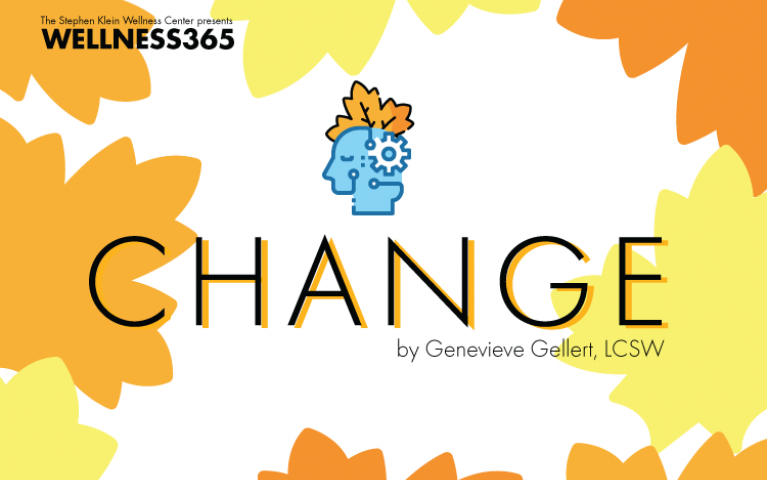Wellness365: Change

The trees are wonderful teachers of change. With the Fall season soon to start, they’re about to model for us how to embrace the inevitability of transition. But, transition is stressful.
I work as a member of the medical team at Stephen Klein Wellness Center to care for people’s wellness, especially their mental, emotional, and behavioral health.
I primarily work with people to help them heal from painful experiences caused or worsened by various life and health transitions through short sessions before or after their appointments with their doctors.
All change is stressful and brings up for us many different kinds of positive and negative emotions. In all change there’s transition, and in all transition there’s loss. One of the most difficult parts of life is dealing with unwanted or unexpected change.
We can be afraid of change and the loss that comes with it. The very act of healing and improving our wellness is a stressful transition. The shift in identity from someone who is unwell to someone who is healing is often scary. Life circumstances, especially the terrible ones, force us to change in ways that we are not ready for or we are unaware of.
Take me for example.
The longest relationship I’ve had is the one I share with my trauma, and our relationship is always changing.
We first met when I was six. She still comes with me everywhere I go. She picks out most of my outfits. She tells me what and how much to eat. She hates yoga because it forces her to look at herself, but she still tags along anyway. She’s distrusting and fearful so she tries to influence my other relationships. My husband didn’t propose to her, but she comes with the package. She checks in a few times a week now. She’s anxious. She’s a cautiously-optimistic, but
well-intending roommate with some control issues.
I learned that my trauma changed me in ways I couldn’t control. But I also learned that we can control the ways in which we respond and relate to change.
Here are 5 ways we can embrace and support change and healing that reduce wear and tear on our bodies:
1. Practice Mindfulness Meditation: Meditating anchors us in our breath and in ourselves, and there are many health benefits. Every Tuesday from 10 am to 11 am, Stephen Klein Wellness Center offers a free Meditation Class.
● Improved concentration – A clear mind makes us more productive.
● Less bothered by little things – We learn to live in the here and now, rather than worrying about the past or future.
● Better Health – There have been numerous studies pointing to the health benefits of meditation. The reason is that meditation reduces stress levels and alleviates anxiety. If we can reduce stress, many health benefits follow.
● Knowledge of Self – Meditation enables us to have a deeper understanding of our inner self. Through meditation we can gain a better understanding of our life’s purpose.
2. Make a doctor’s appointment at SKWC: Stress symptoms can affect our bodies, thoughts, feelings, and behaviors. If left unchecked, stress can contribute to many health problems, such as high blood pressure, heart disease, obesity, and diabetes.
We can also help you have conversations about the changes occurring in your life and / or the changes you are interested in making.
3. Seek support: No one gets through life alone, including me. It’s okay to ask for help—it’s a sign that know ourselves well enough to realize we need some assistance.
You can call SKWC to get information on where and how to seek help.
During times of change and stress, it’s also common to feel depressed and / or triggered and think about hurting yourself or others. I’ve thought about ways to commit suicide.
With the right help, I was able to stop thinking about killing myself. If you ever feel this way, please call the Suicide Prevention Lifeline at 1-800-273-8255 for help in the moment.
4. Develop a self-care plan: Maintain a regular schedule that consists of: eating as healthy as possible, resting as much as possible, engaging in some kind of physical movement, maintaining a list of people you can reach out to for help, and participating in hobbies and activities that bring you joy and help you feel relaxed.
5. Try Self-Compassion: According to Dr. Kristin Neff, we benefit from warmth and understanding for ourselves and others when faced with shortcomings, disappointments, losses, transitions, and challenges.
Here’s a 4 step meditation from Dr. Neff in practicing self-compassion, at any time. I do this exercise at least once a day.
Think of a situation in your life that is difficult, one that is causing you stress.
Now, say to yourself: “This is a moment of suffering.”
Other options include:
“This hurts.” “Ouch.”
“This is stress.”
Now, say to yourself: “Suffering is a part of life.”
Other options include:
“Other people feel this way.” “I’m not alone.”
“We all struggle in our lives.”
Now, put your hands over your heart, feel the warmth of your hands and the gentle touch of your hands on your chest. Or adopt a kind of soothing touch that feels right for you.
Now, say to yourself: “May I be kind to myself.”
Other options include:
“May I give myself the compassion that I need.” “May I accept myself as I am.”
“May I learn to accept myself as I am.” “May I forgive myself.”
“May I be strong.” “May I be patient.”
“May I be patient.”